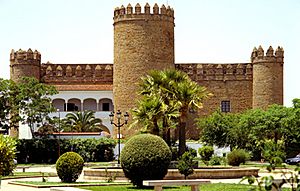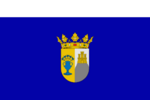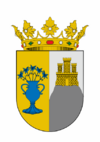Zafra facts for kids
Quick facts for kids
Zafra
|
|||
|---|---|---|---|

The Castle of Zafra
|
|||
|
|||
| Country | Spain | ||
| Autonomous community | Extremadura | ||
| Province | Badajoz | ||
| Comarca | Zafra - Río Bodión | ||
| Area | |||
| • Total | 62.6 km2 (24.2 sq mi) | ||
| Elevation | 508 m (1,667 ft) | ||
| Population
(2018)
|
|||
| • Total | 16,776 | ||
| • Density | 267.99/km2 (694.1/sq mi) | ||
| Demonym(s) | Zafrenses, Segedanos/as | ||
| Time zone | UTC+1 (CET) | ||
| • Summer (DST) | UTC+2 (CEST) | ||
Zafra (Spanish: [ˈθa.fɾa]; Extremaduran: Çafra) is a charming town in the Province of Badajoz. This province is part of Extremadura, a region in Spain. Zafra is also the main town of a local area called a comarca, known as Zafra - Río Bodión.
As of 2011, about 16,677 people live in Zafra. It is a place with a rich history and has been home to some important people. For example, Fray Ruy Lopez, who wrote one of the first books about chess in Europe, was from Zafra. Another famous person was Pedro de Valencia, a well-known thinker and writer.
Contents
Zafra's Ancient History
Zafra has a long and interesting past. People believe that the area around Zafra was settled even in Roman times. The Romans were a powerful empire that ruled much of Europe and beyond.
Roman Traces in Zafra
Historians think Zafra might have been known by different Roman names. These names include Restituta Iulia Imperial or Segida Restituta Iulia. While we are not completely sure which name belonged to Zafra, we know the Romans were here.
You can find signs of Roman life in the area. There are remains of about 20 Roman villas (large country houses) near Zafra. These old ruins show that many Romans lived and worked in this region a very long time ago.
Famous People from Zafra
Zafra is proud to be the birthplace of two notable figures who made a mark in history.
Ruy López de Segura: The Chess Master
One of the most famous people from Zafra is Fray Ruy Lopez. He was a priest, but he was also a brilliant chess player. In the 16th century, he wrote one of the very first books about chess in Europe. This book helped people learn how to play the game better and understand its strategies.
Pedro de Valencia: The Thinker
Another important person from Zafra was Pedro de Valencia. He lived in the late 1500s and early 1600s. Pedro de Valencia was a humanist, which means he was a scholar who studied human culture, history, and philosophy. He wrote many important works and was known for his deep thinking.
See also
 In Spanish: Zafra para niños
In Spanish: Zafra para niños
 | Jackie Robinson |
 | Jack Johnson |
 | Althea Gibson |
 | Arthur Ashe |
 | Muhammad Ali |




